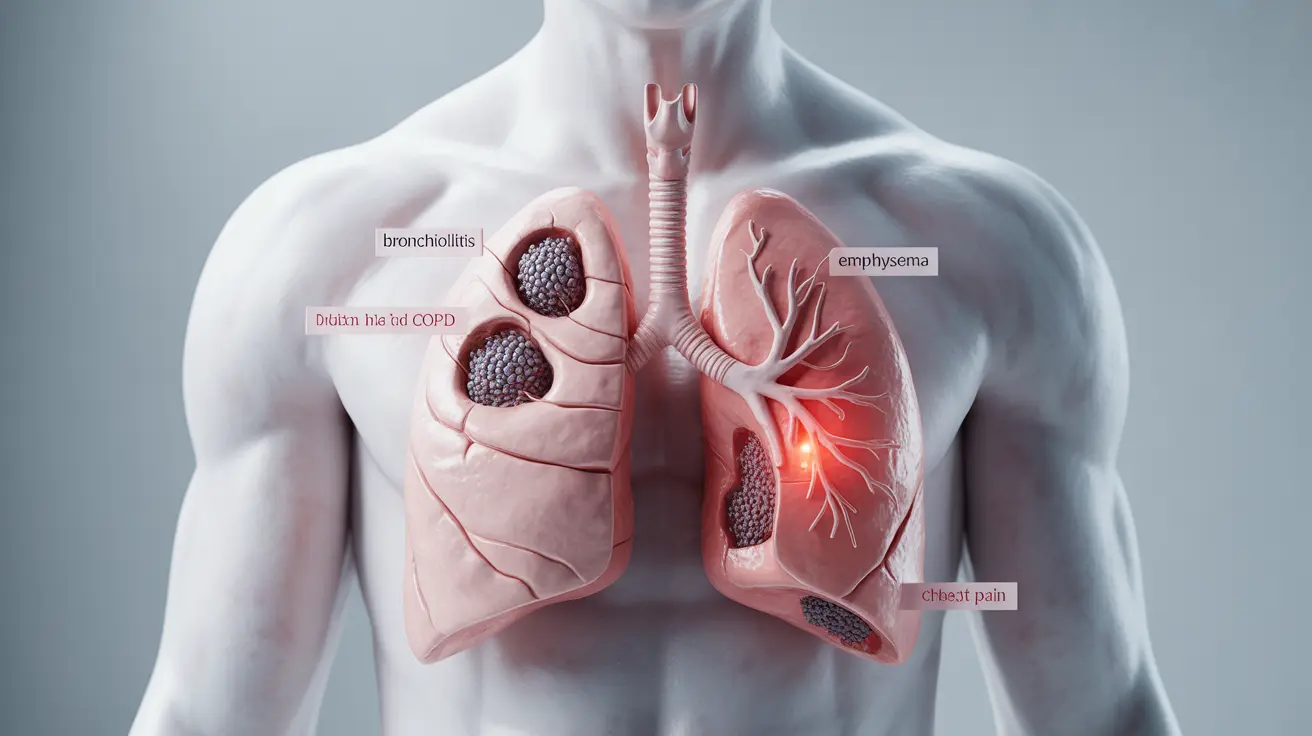Living with Chronic Obstructive Pulmonary Disease (COPD) can be challenging, and chest pain is a concerning symptom that many patients experience. Understanding the relationship between COPD and chest pain is crucial for managing your condition effectively and knowing when to seek medical attention.
This comprehensive guide will help you understand the various causes of chest pain in COPD, recognize warning signs, and learn about available treatment options. We'll also discuss when chest pain might indicate a medical emergency requiring immediate care.
Common Causes of COPD-Related Chest Pain
COPD can cause chest pain through several mechanisms:
- Muscle strain from coughing
- Inflammation of the airways
- Trapped air in the lungs
- Chest wall tension
- Intercostal muscle fatigue
The nature of chest pain can vary significantly among COPD patients. Some experience sharp, stabbing sensations, while others report dull, persistent aches. Understanding these differences can help better communicate symptoms to healthcare providers.
Distinguishing COPD Chest Pain from Other Conditions
Not all chest pain in COPD patients is directly related to their respiratory condition. Several other conditions can cause or worsen chest discomfort:
Cardiovascular Complications
People with COPD have an increased risk of heart problems, which can cause chest pain. These may include:
- Coronary artery disease
- Heart attack
- Pulmonary hypertension
- Angina
Digestive System Issues
Gastroesophageal reflux disease (GERD) frequently occurs alongside COPD and can cause chest pain that mimics respiratory symptoms. The pressure changes in the chest during breathing can worsen GERD symptoms.
Treatment Options for COPD-Related Chest Pain
Managing chest pain in COPD often requires a multi-faceted approach:
Medication Management
- Bronchodilators
- Anti-inflammatory medications
- Pain relievers when appropriate
- GERD medications if needed
Physical Therapy and Exercise
Targeted exercises and breathing techniques can help strengthen respiratory muscles and reduce chest pain. Working with a qualified physical therapist can ensure proper technique and prevent injury.
Lifestyle Modifications
Several lifestyle changes can help minimize chest pain:
- Maintaining good posture
- Using proper breathing techniques
- Avoiding triggers
- Getting adequate rest
- Following a healthy diet
Warning Signs and Emergency Situations
Certain symptoms warrant immediate medical attention:
- Severe, sudden chest pain
- Pain radiating to arms, jaw, or back
- Shortness of breath worse than usual
- Chest pain accompanied by dizziness or fainting
- Blue lips or fingertips
Frequently Asked Questions
What are the common causes of chest pain in people with COPD?
Common causes include muscle strain from coughing, inflammation of airways, trapped air in the lungs, and chest wall tension. COPD can also lead to secondary conditions like GERD or cardiovascular issues that cause chest pain.
How can I tell if my chest pain is related to COPD or something more serious like a pulmonary embolism?
COPD-related chest pain typically worsens with breathing or coughing and may be accompanied by typical COPD symptoms. However, sudden severe pain, especially with shortness of breath, dizziness, or pain radiating to other areas, could indicate a more serious condition requiring immediate medical attention.
What treatments or therapies help relieve chest pain associated with COPD?
Treatment options include bronchodilators, anti-inflammatory medications, breathing exercises, physical therapy, and lifestyle modifications. Pain management strategies should be discussed with your healthcare provider to develop an appropriate treatment plan.
Can GERD or other digestive problems worsen chest pain in COPD patients?
Yes, GERD frequently co-exists with COPD and can significantly contribute to chest pain. The pressure changes in the chest during breathing can worsen GERD symptoms, creating a cycle of discomfort that requires specific management strategies.
When should I seek emergency medical care for chest pain if I have COPD?
Seek immediate medical attention if you experience severe, sudden chest pain, pain radiating to your arms or jaw, shortness of breath worse than usual, chest pain with dizziness or fainting, or if you develop blue lips or fingertips. These could indicate serious complications requiring urgent care.




